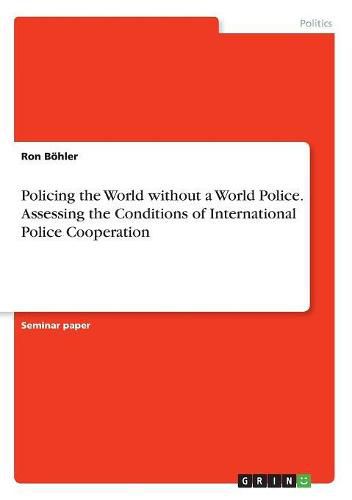Readings Newsletter
Become a Readings Member to make your shopping experience even easier.
Sign in or sign up for free!
You’re not far away from qualifying for FREE standard shipping within Australia
You’ve qualified for FREE standard shipping within Australia
The cart is loading…






This title is printed to order. This book may have been self-published. If so, we cannot guarantee the quality of the content. In the main most books will have gone through the editing process however some may not. We therefore suggest that you be aware of this before ordering this book. If in doubt check either the author or publisher’s details as we are unable to accept any returns unless they are faulty. Please contact us if you have any questions.
Seminar paper from the year 2010 in the subject Politics - International Politics - Topic: International Organisations, grade: 2.0, language: English, abstract: In a speech in 2006, the Secretary General of the International Criminal Police Organization (ICPO) referred to Interpol as ‘the world’s largest international police organization, the world’s only global police organization, and the world’s most effective international police body’. With 188 member countries the ICPO is the second largest international organization after the United Nations, based on intergovernmental cooperation between domestic law enforcement services, the so called National Central Bureaus (NCB). In times when transnational (organized) crime and terrorism increase exceedingly through globalization and the internationalization of transportation and communication systems as well as international trade, the global role of Interpol and the need to react rapidly and effectively emerge as well. Whenever two or more countries are involved in a criminal act, it is a matter of the International Criminal Police Organization. National police agencies adopt a double role: As a states executive branch they are not fully independent from political interventions. The national justice system and the securing of civil society are subjects to the state in order to control social violence and destruction, and to protect the citizens from victimization in the domestic arena. In short: It is a matter of state sovereignty. Related to the international level and the membership in Interpol, the police can instead not be equated with national governments. The NCBs are the “key element[s] in the day-to-day performance of the tasks identified with Interpol and are consequently political actors in international relations.
$9.00 standard shipping within Australia
FREE standard shipping within Australia for orders over $100.00
Express & International shipping calculated at checkout
This title is printed to order. This book may have been self-published. If so, we cannot guarantee the quality of the content. In the main most books will have gone through the editing process however some may not. We therefore suggest that you be aware of this before ordering this book. If in doubt check either the author or publisher’s details as we are unable to accept any returns unless they are faulty. Please contact us if you have any questions.
Seminar paper from the year 2010 in the subject Politics - International Politics - Topic: International Organisations, grade: 2.0, language: English, abstract: In a speech in 2006, the Secretary General of the International Criminal Police Organization (ICPO) referred to Interpol as ‘the world’s largest international police organization, the world’s only global police organization, and the world’s most effective international police body’. With 188 member countries the ICPO is the second largest international organization after the United Nations, based on intergovernmental cooperation between domestic law enforcement services, the so called National Central Bureaus (NCB). In times when transnational (organized) crime and terrorism increase exceedingly through globalization and the internationalization of transportation and communication systems as well as international trade, the global role of Interpol and the need to react rapidly and effectively emerge as well. Whenever two or more countries are involved in a criminal act, it is a matter of the International Criminal Police Organization. National police agencies adopt a double role: As a states executive branch they are not fully independent from political interventions. The national justice system and the securing of civil society are subjects to the state in order to control social violence and destruction, and to protect the citizens from victimization in the domestic arena. In short: It is a matter of state sovereignty. Related to the international level and the membership in Interpol, the police can instead not be equated with national governments. The NCBs are the “key element[s] in the day-to-day performance of the tasks identified with Interpol and are consequently political actors in international relations.